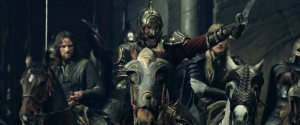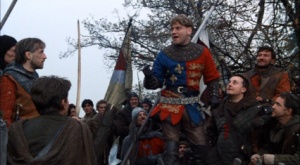Quite recently, I stumbled across this quote, posted by a once-upon-a-time friend:
“What can men do against such reckless hate?”
With no author attribution, I turned to Google, and my brief search yielded the result that this line belongs to King Théoden, in Peter Jackson’s The Two Towers, the second movie installment of J.R.R. Tolkien’s magnificent epic trilogy, The Lord of the Rings. It set my mind spinning around battle speeches and I moved my feet to the bookshelf and my focus to the written story and Tolkien’s last book, The Return of the King. To preface, Théoden is a King trying to win battles and help restore peace in the magical land of Middle Earth. To continue, he spoke these lines to his Riders of Rohan, the warriors of his kingdom, to inspire them with all the loyalty and courage he could muster up. He shouts:
“Arise, arise, Riders of Théoden! Fell deeds awake; fire and slaughter! Spear shall be shaken, shield be splintered, a sword-day, a red day, ere the sun rises! Ride now, ride now! Ride to Gondor.”
In the hour of “reckless hate,” whether book II or book III, Théoden turns the despair of his men into hope and inspires in them the desire to fight with a charge towards battle. Tolkien published his trilogy in the 1950s, while the memories of the World Wars were still too fresh to too many people. He captures, though, in these battle words of Théoden, a sense of the glory of fighting for a higher cause and striving toward a better future. Tolkien was not the first to do so. Shakespeare wrote, three hundred years earlier, another call to arms:
Once more unto the breach, dear friends, once more;
Or close the wall up with our English dead!
In peace, there ’s nothing so becomes a man,
As modest stillness and humility:
But when the blast of war blows in our ears,
Then imitate the action of the tiger;
Stiffen the sinews, summon up the blood.
(Henry V, 3.1.1)
Though Théoden struggled against Sauron’s armies and Henry V fought the Dauphin of France, both men found themselves in a moment where their words might change the impending outcome of battle. How do you gain the respect of warriors who are witnessing the fall of once great kingdoms? The kings’ approach recognizes the humanity still present and necessary to grasp when approaching a battle. Théoden, we know, has already acknowledge that a driving force against which must be fought is that “reckless hate,” which in parallel to his speech before the battle at the Pelennor fields before Gondor, heightens the image of riding “ere the sun rises.” Tolkien impresses the need for a rising sun after an initial chaos of the “shaken” “spear” and “splintered” “shield.” As well, Henry V compares a soldier in battle with animal instinct, removing the intellect of a human from “the action of the tiger.” Commenting on this speech, John S. Mabane argues that, according to Shakespeare in these lines, “… combat is unnatural to human beings and reduces them to the level of beasts” (262).
How to reconcile this contradiction of human nature?
Théoden urges his men to “Ride now, ride now” and stay focused on the rising “sun.”
Henry V reminds his men to “summon up the blood,” but only as “tigers” would, and to remain as men “in peace.”
Though separated by hundreds of years, the creation of an alternate world, and some iambic pentameter, Tolkien and Shakespeare bring their kings together in a call to arms. Their battle speeches are proclaimed to men, not beasts, because ultimately, “ere the sun rises,” those kings shall lead their men to victory.




